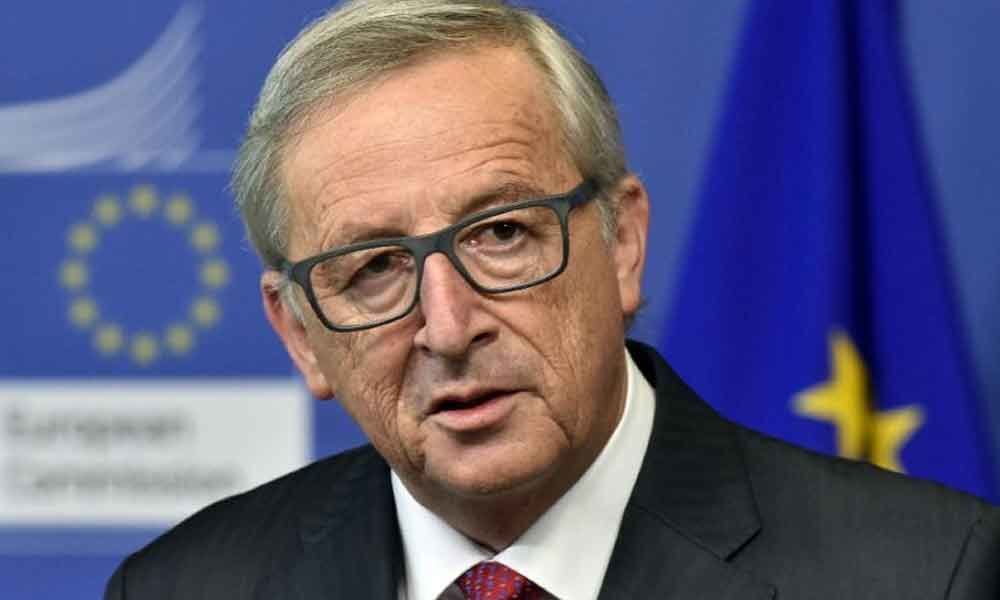Live
- Three persons admitted to hospital for diarrhea treatment
- First Star Outside Milky Way Captured: WOH G64 is 2,000 Times Larger Than the Sun
- Sikkim govt to constitute state Niti Ayog: CM Tamang
- CBI books Rajasthan narcotics inspector for Rs 3 lakh bribe
- Rajasthan bypolls: A tough contest between BJP and Congress
- Albania joins SEPA, paving way for EU integration
- Japanese government approves 250-billion USD economic package to ease price pain
- Six pharma companies to set up their units in Telangana
- The Unstable Events of a 17-Wicket Day in Perth: India vs Australia
- Dutch FM's Israel trip cancelled after Netanyahu's arrest warrant
Just In

Complex power struggle between states, blocs lies masked.
Brussels: European leaders descended on Brussels on Tuesday to begin the hunt for a new generation of top EU officials in the wake of elections that shook up traditional alliances.
The key job to be filled is that of president of the European Commission, the union's powerful chief executive, a five-year post currently held by Jean-Claude Juncker.
Under EU treaty law, the European Council of 28 national leaders nominates a commission president, then the new 751-member parliament ratifies their choice.
But the procedure, while seemingly straightforward, masks a complex po-wer struggle between rival states and ideological blo-cs and between the leaders and parliament itself.
Juncker's deputy and the centre-left challenger for the top job, former Dutch minister Frans Timmer-mans, compares the ruthless intrigue to Game of Thrones.
The tussle kicks off on Tuesday when European Council President Donald Tusk hosts the EU leaders for a summit dinner in Brussels to lay out the ground rules.
Ahead of the summit, party and national leaders met in various smaller groups to scheme, and the heads of the main party blocs in the parliament held closed door talks.
Many in Brussels argue that the European project is best served by a "political commission" headed by a president with a mandate from the parliament.
But most national leaders think the union's legitimacy derives from its member states and that the Council should be able to pick one of their own — someone with leadership experience.
The results of the EU elections did not strengthen parliament's hand — except perhaps for the boost of the larger than expected voter turnout.
While a threatened surge of eurosceptic and far-right populist parties was largely contained, the pro-Europe centre was fragmented, with liberals and Greens gaining ground.
In previous years, a coalition of the socialist S&D and the conservative EPP was able to wield a majority. Now they cannot govern without the liberal ALDE or the Greens. And this complicates their choice of a "spitzenkandidat" — or lead candidate — for the Commission.
The EPP insists that as it is the biggest bloc, its candidate Manfred Weber must be Commission president, but it lost around 40 seats at the election, only narrowly remaining the largest group.
But Weber, who has spent the last 15 years in the European Parliament, is seen as short on charisma, has no executive experience — and is opposed by French President Emmanuel Macron.
Eight of the 28 EU leaders hail from EPP parties, but Hungarian premier Viktor Orban's Fidesz is suspended from the group and Austrian Chancellor Sebastian Kurz was ousted by parliament on Monday. Timmermans, a centre-left Dutchman with more executive experience, will have the S&D's backing and ALDE, while dubious about the process, could back Margrethe Vestager.
The Danish competition commissioner might win Macron's support while Germany's Chancellor Angela Merkel backs Weber.
Macron met Spain's Prime Minister Pedro Sanchez for dinner on the eve of the summit.

© 2024 Hyderabad Media House Limited/The Hans India. All rights reserved. Powered by hocalwire.com







